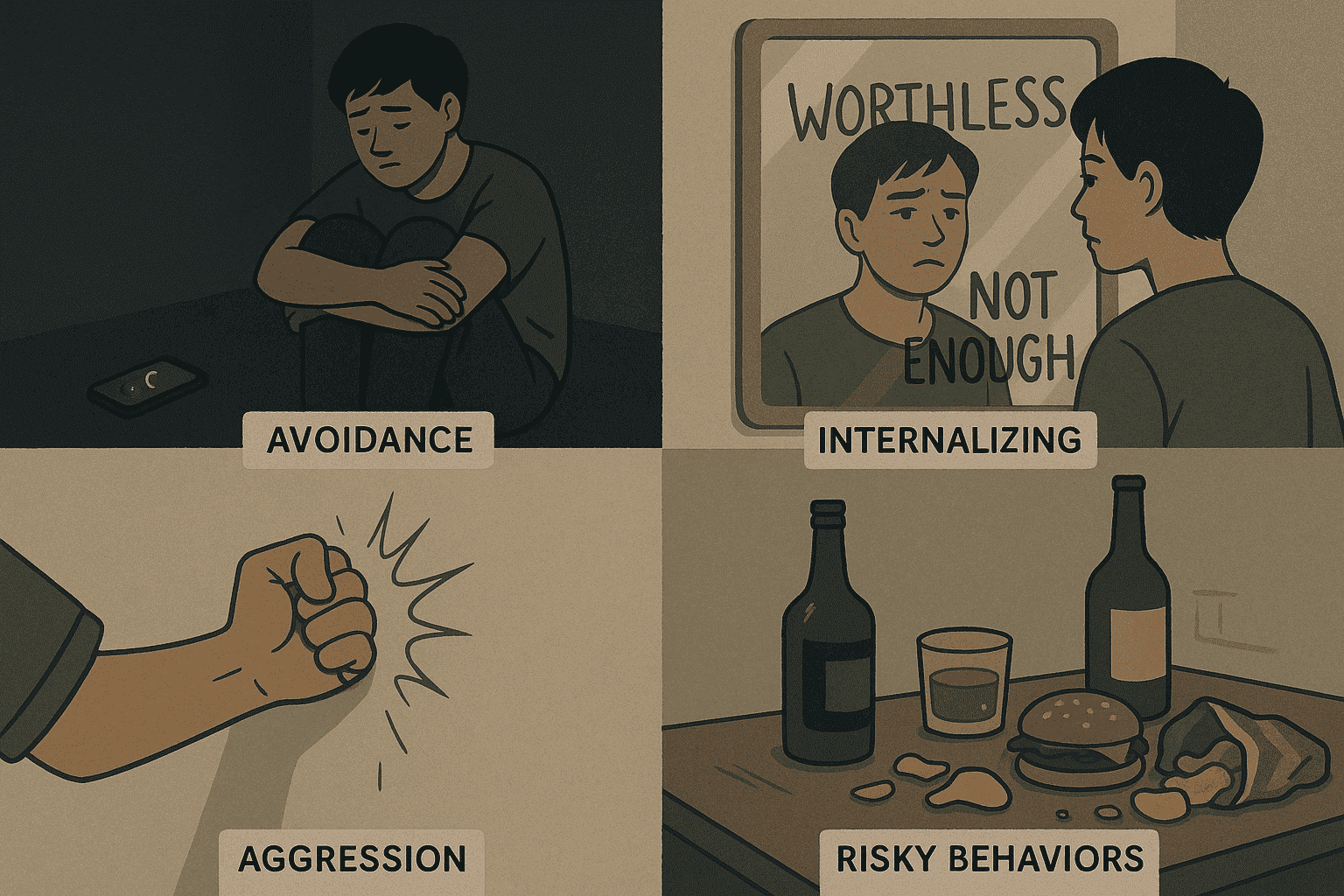Unhealthy Ways to Cope with Bullying and How to Heal Healthier

Bullying leaves deep marks, not just in childhood but also in adulthood. The pain of being targeted, excluded, or humiliated often lingers long after the incident ends. When faced with these experiences, many people reach for quick fixes that seem to numb the hurt. Unfortunately, some of these responses become unhealthy ways to cope with bullying—habits that may bring temporary relief but ultimately deepen the wounds.
As a therapist, I see how important it is to understand not only what people do to survive bullying but also how those coping mechanisms affect long-term well-being. By recognizing harmful patterns, you can begin to replace them with healthier tools for healing and resilience.
Escaping Through Avoidance
One of the most common responses to bullying is avoidance: skipping school, calling in sick to work, or retreating from social settings. In the short term, this may feel protective—stepping away removes you from the painful situation. But when avoidance becomes a primary strategy, it often leads to isolation.
The more you withdraw, the smaller your world becomes, and the easier it is to believe that you truly don’t belong. This can reinforce feelings of shame and hopelessness. Instead of shrinking your environment, it is often more effective to create safe, supportive spaces where you can still feel connected. This might mean joining a trusted group, engaging in hobbies, or seeking professional counseling to reframe experiences and gradually rebuild confidence.
Internalizing the Hurt
Another destructive pattern is turning the bully’s words inward. If someone is repeatedly told, “You’re worthless,” “You’ll never fit in,” or “You’re not good enough,” it is common to begin believing those lies. Internalization transforms external hostility into a damaging inner voice.
Over time, this internal voice can cause anxiety, depression, or an ongoing sense of inadequacy. Clients I work with often struggle with self-criticism long after the bullying has ended. The healthier alternative is learning to challenge these negative thoughts with evidence from your own strengths, achievements, and supportive relationships. Therapy, affirmations, and compassion-focused exercises are powerful tools for reprogramming the inner dialogue.

Retaliation and Aggression
It is natural to feel anger when mistreated, but sometimes the pain fuels retaliation. Lashing out at others—either verbally or physically—may feel like a way to reclaim power. However, it often perpetuates harm and can lead to strained relationships, disciplinary action at school or work, or even legal consequences.
A healthier approach is to find constructive outlets for anger. Physical exercise, journaling, or practicing assertive (not aggressive) communication helps transform frustration into strength. For example, saying calmly, “I deserve to be treated with respect” sets a clear boundary without escalating conflict. These tools empower you without mirroring the bully’s behavior.
Risky Behaviors and Self-Destructive Coping
Some individuals turn to substances, self-harm, or disordered eating as a way to dull emotional pain. While these behaviors may provide temporary numbness, they carry long-term risks to both physical and mental health. Alcohol, drugs, or other self-destructive habits can quickly spiral into patterns that feel impossible to escape.
Recognizing these actions as unhealthy ways to cope with bullying is a crucial step toward recovery. Reaching out for support—whether through therapy, hotlines, or peer groups—provides safer and more sustainable options for relief. Professional help can also address the root of the pain, not just the symptoms.
Suppressing the Experience
Some people respond to bullying by shutting it away entirely. They try to “just move on” without talking about it or processing what happened. Suppression may look like strength on the outside, but unacknowledged wounds often resurface later as irritability, difficulty trusting others, or unexplained stress.
Talking about your experiences does not mean dwelling on them forever. Sharing your story with a trusted friend, family member, or therapist can transform silence into empowerment. Many people find that once they begin speaking, the weight they’ve carried feels lighter and less overwhelming.

Moving Toward Healthier Strategies
Recognizing these patterns does not mean blaming yourself—it means giving yourself permission to heal differently. Instead of withdrawing, retaliating, or self-destructing, you can experiment with alternatives that foster resilience and self-worth:
- Seeking support. Share your experiences with trusted friends, mentors, or professionals who can validate your feelings.
- Grounding and mindfulness techniques. Simple practices like focused breathing, meditation, or body scans can reduce stress in the moment.
- Affirmations and achievements. Celebrating small successes and using affirmations helps rebuild self-esteem eroded by bullying.
- Assertive communication. Learning to set boundaries clearly, without aggression, reinforces your sense of dignity.
Healing from bullying takes time. The scars it leaves are real, but they do not have to define your future. In fact, acknowledging the unhealthy ways to cope with bullying is often the turning point where individuals begin to reclaim their strength and dignity.
Conclusion
Bullying leaves scars, but those scars are not permanent markers of your worth. By identifying unhealthy ways to cope with bullying and consciously choosing healthier alternatives, you can grow stronger, reclaim your voice, and experience relationships built on respect. Remember, healing is not about pretending the hurt never happened—it’s about learning new ways to carry that pain with resilience and self-compassion.
If you’re facing challenges from bullying or other difficulties in life and work, I encourage you to reach out. Talking to a therapist can help you process painful experiences, build healthier coping strategies, and rediscover your sense of confidence and self-worth. Seeking support is not a sign of weakness but a courageous step toward healing and growth.